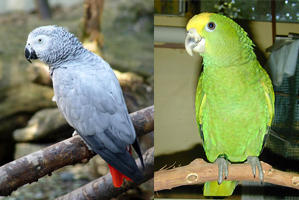Adopting a Pet Bird from a Shelter

As with any companion animal, potential bird adopters should be ready to invest money for regular veterinary care, a nutritious and varied diet, appropriately-sized cages and toys. Birds are social creatures. Birds in the parrot family particularly depend upon human contact for their happiness and well-being. Owners must be prepared to spend time playing with and talking to their feathered friends. Once the decision is made to adopt, a variety of bird species with distinct characteristics and needs are available. Tiny canaries delight with their vibrant colors and beautiful songs. Fast-moving finches can entertain observers for hours. Looking for a more interactive bird? Budgies and cockatiels enjoy being handled and often mimic words and household noises. And if you can commit substantial time and space to a loud, demanding, intelligent bird, one of the larger members of the parrot family may be right for you. These brainy birds need mental stimulation, companionship and extensive exercise time out of their cages daily. Keep in mind that medium-to-large parrots can live 25-50+ years.
How do you know if a bird is the right pet for you? And how do you decide what type of bird will best suit your household? The following scenarios should help potential owners make a decision that's right for them and a new avian friend:
- I don't like a lot of mess: Choose small birds, such as parakeets, canaries, finches or lovebirds.
- I don't like loud screaming birds: Although there are individual exceptions, avoid conures, parrots and cockatoos.
- I don't have much space: Choose any bird, as long as you allow for a large enough cage and time out of it almost every day.
- I am afraid of being bitten by my bird: If this is a concern, find out how large your bird will be when fully grown. As babies, medium and large-sized birds are very sweet and have little beak strength. But when they mature, they can become somewhat aggressive, their beaks more powerful and their behavior somewhat erratic. Instead, choose a smaller bird, such as a cockatiel, who is less able to cause harm when it bites
- I want my bird to talk: African gray parrots and Amazon parrots are considered the best talkers, but there is no guarantee that your bird will talk. Birds who speak the most are those who are spoken to most often.
- I am concerned about how my new bird will get along with other pets and young children. Adequate space and close adult supervision will promote harmony among birds, children and other pets. You will need a room in which you can close off your bird for his or her protection when you are not present, even if you are just in another room. If you have a very large bird, such as a macaw, you may need to protect your children and other pets from the bird if he has been provoked inadvertently.
- I want my bird to bond with me, so maybe I'll buy an unweaned bird. Newborn, unweaned birds, like human infants, need to be fed by hand, which requires a great deal of care. Also, they are more likely to develop problems that weaned birds (birds able to eat by themselves) don't experience. So if you have no prior experience hand-feeding birds, make sure the bird you select is weaned. As for the bonding issue, birds that are young but already weaned bond very well with caring and affectionate owners.

African Gray Parrot (left) and Amazon Parrot (right)
[ Search Articles ] [ Article Index ]
